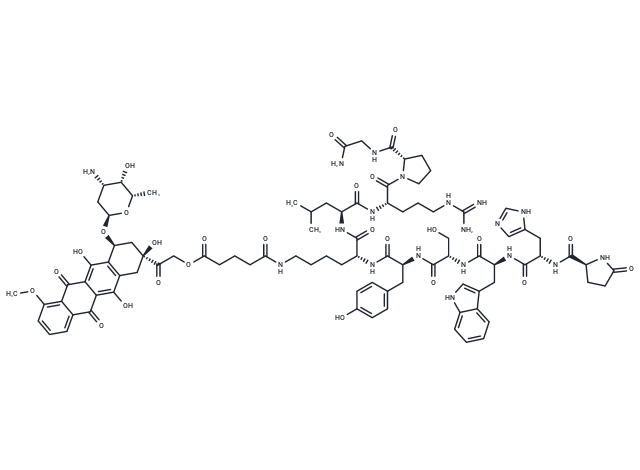 您的购物车当前为空
您的购物车当前为空
Zoptarelin doxorubicin
一键复制产品信息Zoptarelin doxorubicin, also known as AEZS-108, is an LHRH agonist. Zoptarelin doxorubicin is a peptide agonist of the gonadotropin releasing hormone-1 receptor (GnRH-1R) that is conjugated to the anthracycline antibiotic doxorubicin with potential antineoplastic activity. Zoptarelin doxorubicin binds to GnRH-1Rs, which may be highly expressed on endometrial and ovarian tumor cell membrane surfaces, and is internalized. Once inside the cell, the doxorubicin moiety of this agent intercalates into DNA and inhibits the topoisomerase II activity, which may result in the inhibition of tumor cell DNA replication and tumor cell proliferation

Zoptarelin doxorubicin
一键复制产品信息Zoptarelin doxorubicin, also known as AEZS-108, is an LHRH agonist. Zoptarelin doxorubicin is a peptide agonist of the gonadotropin releasing hormone-1 receptor (GnRH-1R) that is conjugated to the anthracycline antibiotic doxorubicin with potential antineoplastic activity. Zoptarelin doxorubicin binds to GnRH-1Rs, which may be highly expressed on endometrial and ovarian tumor cell membrane surfaces, and is internalized. Once inside the cell, the doxorubicin moiety of this agent intercalates into DNA and inhibits the topoisomerase II activity, which may result in the inhibition of tumor cell DNA replication and tumor cell proliferation
| 规格 | 价格 | 库存 | 数量 |
|---|---|---|---|
| 25 mg | ¥ 22,700 | 10-14周 | |
| 50 mg | ¥ 30,300 | 10-14周 | |
| 100 mg | ¥ 39,500 | 10-14周 |
产品介绍
| 产品描述 | Zoptarelin doxorubicin, also known as AEZS-108, is an LHRH agonist. Zoptarelin doxorubicin is a peptide agonist of the gonadotropin releasing hormone-1 receptor (GnRH-1R) that is conjugated to the anthracycline antibiotic doxorubicin with potential antineoplastic activity. Zoptarelin doxorubicin binds to GnRH-1Rs, which may be highly expressed on endometrial and ovarian tumor cell membrane surfaces, and is internalized. Once inside the cell, the doxorubicin moiety of this agent intercalates into DNA and inhibits the topoisomerase II activity, which may result in the inhibition of tumor cell DNA replication and tumor cell proliferation |
| 分子量 | 1893.01 |
| 分子式 | C91H117N19O26 |
| CAS No. | 139570-93-7 |
| Smiles | O([C@@H]1C2=C(C(O)=C3C(=C2O)C(=O)C=4C(C3=O)=CC=CC4OC)C[C@](C(COC(CCCC(NCCCC[C@@H](NC([C@H](CC5=CC=C(O)C=C5)NC([C@@H](NC([C@H](CC=6C=7C(NC6)=CC=CC7)NC([C@H](CC8=CN=CN8)NC(=O)[C@H]9NC(=O)CC9)=O)=O)CO)=O)=O)C(N[C@H](C(N[C@H](C(=O)N%10[C@H](C(NCC(N)=O)=O)CCC%10)CCCNC(=N)N)=O)CC(C)C)=O)=O)=O)=O)(O)C1)[C@H]%11C[C@H](N)[C@H](O)[C@H](C)O%11 |
| 存储 | keep away from moisture | Powder: -20°C for 3 years | In solvent: -80°C for 1 year | Shipping with blue ice/Shipping at ambient temperature. |
计算器
体内实验配液计算器
剂量转换
对于不同动物的给药剂量换算,您也可以参考 更多





 还可以
还可以
 |
|